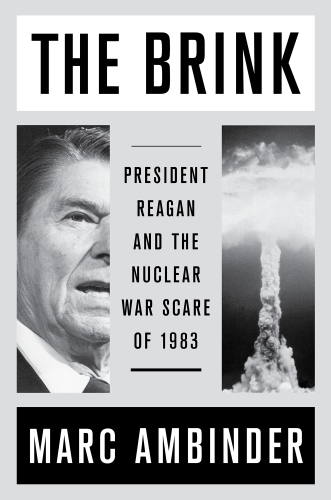
The Brink
President Reagan and the Nuclear War Scare of 1983
کتاب های مرتبط
- اطلاعات
- نقد و بررسی
- دیدگاه کاربران
نقد و بررسی

March 1, 2018
Respected reporter and award-winning television producer Ambinder zeroes in on the nerve-wracking year when Soviet leaders so feared a nuclear strike from America that they put their intercontinental ballistic missiles on a three-minute alert.
Copyright 2018 Library Journal, LLC Used with permission.

April 15, 2018
An account of the tense relations between the United States and the Soviet Union during Ronald Reagan's first presidential term.On Nov. 7, 1983, NATO commenced a five-day military exercise called Able Archer 83. In simulating a Warsaw Pact invasion of Western Europe and a NATO nuclear response, Able Archer scared the Soviet Union into believing that an actual U.S.-led attack was imminent. Thus the Russians readied their nuclear forces and placed military units in Eastern Europe on alert, bringing the two superpowers to the edge of war. Ambinder (co-author: Deep State: Inside the Government Secrecy Industry, 2013), a former White House correspondent and TV producer, chronicles the road to this near catastrophe. In relating incidents such as Reagan's "evil empire" speech, the Soviet Union's shooting down Korean Air Lines Flight 007, and the installation of Pershing II missiles in Western Europe, the author skillfully places the Able Archer exercise within the context of the fraught Cold War atmosphere of the early 1980s. He also persuasively argues that a key to the easing of this tension was Reagan's belated understanding that Russian distrust was rooted in the fact that, as the president noted in his diary, "many people at the top of the Soviet hierarchy were genuinely afraid of America and Americans." The book features interviews with government officials and spies who were on the scene, and Ambinder writes in the appealing style of Tom Clancy. Yet he compromises the narrative with short chapters that bounce from place to place and a frustrating tendency to omit dates. Moreover, the author employs an extensive cast of characters and a plethora of acronyms (although he does provide lists for both). The fulcrum of the book--the Able Archer exercise and the Soviet reaction to it--is somewhat anticlimactic.An informative and often enthralling book, but it is tough sledding. Readers must pay strict attention lest they get lost in the story.
COPYRIGHT(2018) Kirkus Reviews, ALL RIGHTS RESERVED.

Starred review from May 28, 2018
Journalist Ambinder’s account of a serious threat of global annihilation—stemming from a 1983 NATO war exercise—is spellbinding. Ambinder lays out the grave weaknesses in America’s nuclear command-and-control structure in the early 1980s: the process the president was supposed to use to make decisions about whether to launch nuclear missiles was much too long, and the U.S.’s early warning system was unreliable. Those problems informed the Reagan administration’s approach to the Soviets; in order to mask the U.S.’s vulnerability to a first strike, Reagan sought to add to America’s nuclear arsenal (feeling that “the best way to reduce the threat to the U.S. would be to increase the threat to the Soviet Union”). The practical implications of this dysfunction manifested during Able Archer 83, “an annual dry run” of the transfer of NATO’s nuclear warheads from American control to European custodians, when a change in communication methods and patterns gave the Soviets the mistaken impression that the exercise might be a cover for an American first strike on the Soviet Union, which readied troops and nuclear weaponry to respond. While disaster was averted, Ambinder illuminates the fragility of existing safeguards against an unintentional launch, a timely topic given concerns about Iran and North Korea. He also walks the reader through the Reagan administration’s and the Soviet government’s respective internal debates about diplomatic and military strategy. This is a masterpiece of recent history. Agent: Eric Lupfer, Fletcher & Co.

























دیدگاه کاربران